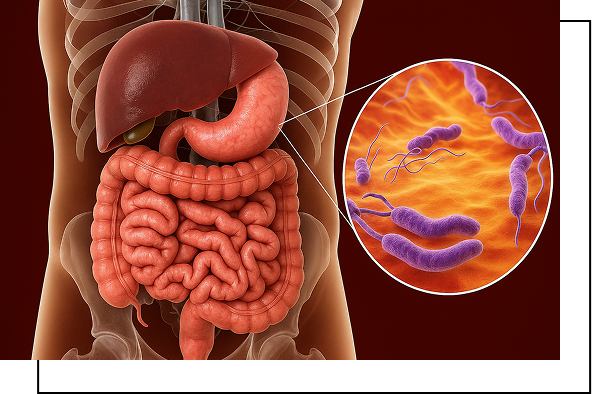Helicobacter Pylori Infection
Treatment in Kolkata
Home > Stomach Diseases > H Pylori Infection
Overview
H. pylori infection occurs when a common bacteria called Helicobacter pylori infects your stomach lining. This infection can cause conditions like gastritis, peptic ulcers, or even stomach cancer in rare cases.

H Pylori Infection Symptoms
Most people with H. pylori infection may not notice symptoms initially. However, common signs include:
Burning or aching stomach pain
Gastric lymphoma or adenocarcinoma
Bloating
Unexplained weight loss
Nausea and vomiting
Duodenal and gastric ulcer

Frequent burping
Loss of appetite
Note: If you experience persistent symptoms, consider a helicobacter pylori test to diagnose the condition.
Book An Appointment
Causes and Risk Factors
Several factors can contribute to H. pylori infection, including:
Contaminated food and water or utensils
Close contact with infected people
Poor sanitation conditions
Living in crowded conditions
Limited access to clean water
Family history of infection
Evaluation
Doctors in Kolkata can detect H. pylori through simple, non-invasive H Pylori tests such as:
Breath tests
Blood tests
Stool tests
Endoscopy with biopsy
Management
H. pylori treatment typically involves:
Antibiotics (usually two types)
Proton Pump Inhibitors (PPIs)
Acid-reducing medications
2-week treatment course and H-2 blockers
Follow-up testing to confirm the cure
Book An Appointment
FAQs
Know Your Answers
Can H. pylori cure on its own?
No, H. pylori infection typically requires treatment with antibiotics to completely eliminate the bacteria. Left untreated, the infection can lead to complications like ulcers and, in rare cases, stomach cancer.
Is H. pylori contagious?
Yes, H. pylori can spread through close contact, especially within families sharing food or utensils.
How long does H. pylori treatment take?
The standard treatment course for H. pylori usually lasts 10-14 days. This typically involves a combination of antibiotics and medications to reduce stomach acid. Follow-up tests are essential to confirm the successful removal of the bacteria.
Can H. pylori infection cause ulcers?
Yes, H. pylori infection can significantly increase the risk of developing peptic ulcers. However, it’s important to remember that not everyone with this infection will experience ulcer symptoms.
What are preventive measures for H. pylori infection?
There is no specific way to prevent H. pylori infection, but you can reduce your risk by:
- Practicing good hygiene, such as washing your hands frequently.
- Eating and drinking only safe food and water.
- Avoiding close contact with people who are infected with H. pylori.

